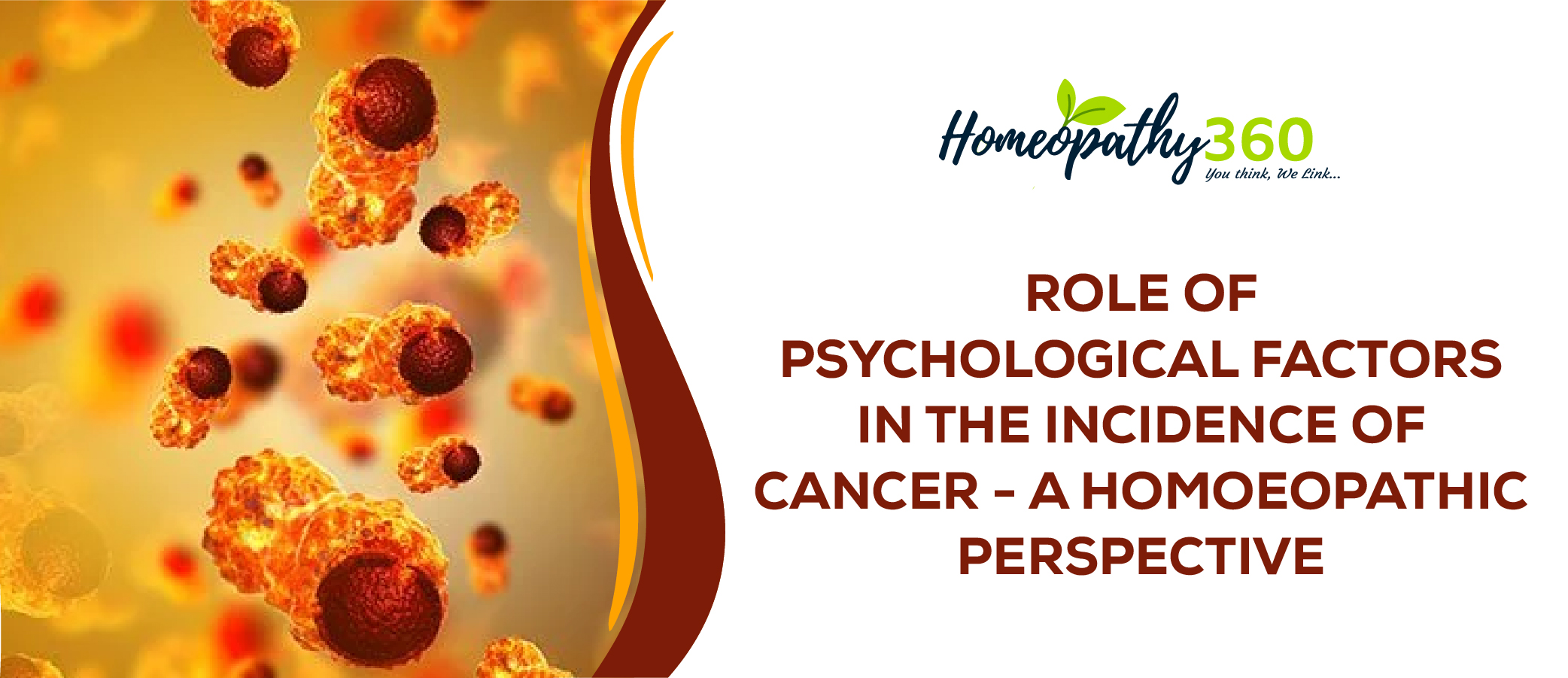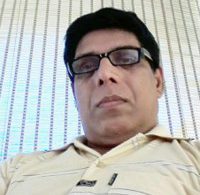
ABSTRACT
Disease originates in the mind and vitiates itself on the physical body. This has been well justified through understanding of miasms from the homoeopathic viewpoint. It is clearly explained through interpretation of miasms that the mad race for fulfillment of desires is one of the key causes of the physical disease. Cancer stands no different.
Modern medicine is also understanding the correlation between stress and physical illness. Many a times, it is also felt that the psyche of patients also holds a crucial aspect in promulgation of the disease. The following article tries to explain the role of mind in the evolution of cancer.
Keywords: cancer, mind, stress, homoeopathy.
Introduction
The body is only a reflection of the mind; the “subtlety” of the mind has been expressed in the “materiality” of the body. What lies in the mind as “thought” is expressed in matter as body. The body is the creation of the mind.
Moreover, Organon of medicine suggests that continuous worry, wrongs, vexation, anxiety, or continuously occurring frights or fear also destroys one’s health usually to a greater extent.[1]
The conditions prevail in one’s mind, in their feelings, thoughts and their will, which the further effects the physical body in liver, spleen and kidney. It is the thought, the feeling and the will that shape the body and the different parts in it giving them diseased conditions. Disease, thus, begins in the interior and then comes to the exterior, from the centre to the circumference, from the mind to the body. If this is the course of disease, then the course of cure also must be the same, i.e. from the centre to the circumference, from the mind to the body; because, unless that is done, i.e. if the cure begins from the circumference to the centre, from the body to the mind, the effect of the disease will only be removed, and the cause, which is in the centre, in the mind, will continue to work on and produce effects eternally. By removing the effect, you cannot remove the cause. The destruction of the effect, is not the destruction of the cause. Cutting down the branches is not cutting down the tree, similarly, the disease cannot be demolished by removing the bodily expression of it. The difference between individual and individual means a difference between their respective minds, and this again means a difference between their actions and physical body, which means difference in their diseases.[2]
Daily practise shows that there is a mental or emotional blockage behind every second to third physical symptom. Only when this emotional blockage is solved, the body succeeds in implementing existing and applied solutions and it can heal.
The ancient Greeks thought that the uterus wandered about the body causing symptoms. But it is not an organ that wanders, it is sadness. And it is looking for a way out.[3] Simple management of the mental symptoms is sufficient to dispel the physical changes brought on by the stress which was very much evident in this condition.
Understanding Cancer
A believe that cancer is, in some manner, linked with distressful emotions or stress goes back since the first recorded history of the disease. In a research conducted 2,000 years ago, the author, De Tumoribus Galen, stated that women that are melancholy are more susceptible to any condition of cancer, instead of other women that are not, because they had too much mélaschole or black bile. Till the year 1701, it was quite difficult to read about or research on the concepts of cancer, as there was not much written about in the medical literature specially in the english Language. After 1701, an author named Gendron, a british physician, talked about the impacts of “disasters of life as occasion much trouble and grief” in cancer causations. Burrows 80 year later, attributed cancer to “the uneasy passions of the mind with which the patient is strongly affected for a long time.”
Nunn, an 18th century physician, presented numerous researches discussing the emotional aspects which gave rise to breast tumours, whereas another author, Stern, talked about cervix cancer in female patients were commonly diagnosed in more frustrated and sensitive individuals. Another major dissertation written by Walshe, titled, “the nature and treatment of cancer” appealed high-attention to the “influence of mental misery, sudden reverses of fortune and habitual glooming’s of the temper on the disposition of carcinomatous matter. If systematic writers can be credited, these constitute the most powerful cause of the disease.”[4]
Effect of some psychosocial aspects in the progression or development of cancer has been a very long-lasting hypothesis ever-since its initiation. Snow in the year 1893, came up with one of the first summary of statistics discussing the psychological aspects of people diagnosed to uterine or breast cancer.[5] Nearly 250 females with these two kinds of cancer were found to have “general liability to the buffets of ill-fortune.”
Numerous researches believed that life as it is, is highly stressful than the lives of people of ancient times, and the only consequence of stress is diseases, specifically cancer. Sontag presented this in metaphorical manner that this disease is an “outward expression of character[6].
Homoeopathic perspective
Homoeopathic understanding of cancer is that it is the “disease of adaptation.” The violation of life space in this adaptive mechanism is responsible for the physical alteration that is reflected in form of cancer. One of the effects of evolution on human mechanism is the resulting changes in the organic characteristics on the spiritual, physiological, as well as psychological experiences of people that alters the dynamics of present life experiences. Other than experiencing the possibilities of human life today, people are going through things like cancer. The schedule followed by people today is adding to the growth and severity levels of diseases. Cancer is the condition resulting from a combination of both current life choices as well as the past imprints.
As the patient adapts to the changes and sees this as a compromise to his life circumstances, then cancer is evident. The trouble with compromise is that nobody wins, it is like a slow death engulfing the patient in its fold. [7]
The violation of own life spaces is seen in patients who have been trained to adjust to the circumstances. The only belief held widely is that both the psychological and emotional processes has an impact on the general well-being, mental health, as well as the physical health of a person. All these factors join together to become one holistic aspect of any person, and is considered as the foundation of one’s life. The patient as a child did not express himself properly as he was objected on trivial matters. This changed the mindset of the patient who in the course of time kept adjusting and was never able to realize the self. The suppression and domination were the results of this adjustment which forced him to ‘stay within.’ As a result, there was destruction of emotions and spontaneity in the individual. At the cellular level there was this outburst which explains the syphilitic trait of this disease and also justifies the pathology from the homoeopathic viewpoint.
The therapeutic assay of the medicines which have been found relevant in this and similar pathology also supports this viewpoint. The importance of Carcinosinum in conditions of dominance and suppression has been exemplified in the homoeopathic literature and has been repeatedly verified through cases.
Repertorial approach[8]
These are some of the rubrics from the Synthesis Repertory, which corroborate to the life situation of the adjustment phenomenon which has been described here as an important element in the cancer pathology.
MIND – AILMENTS FROM – domination
MIND – AILMENTS FROM – domination – long time; for a
MIND – AILMENTS FROM – anger – suppressed
MIND – EMOTIONS – suppressed
MIND – AILMENTS FROM – reproaches
MIND – AILMENTS FROM – mortification
MIND – AILMENTS FROM – scorned; being
Casestudy
The conceptual aetiology of the difficulty in adjustment is well illustrated in this case of cancer of left mammae where the patient, a female in her 40’s, complained of glandular growth with mild and pulsating pain which extended from her left mammae to the arm pit. She came with her attendants on 16/02/2015. She was suffering for the past two years with this complain. There was in-drawing of the nipples in the affected breast. She felt better on holding the chest.
Nothing significant was noted in her past history. In her family history, the significant findings were that her father died of complains of breathlessness and one of her brothers was dumb.
On the mental plane, the patient came from a rural background and was illiterate and was married to a farmer and had three children (two sons and one daughter). She was abused by her husband (who was a drunkard) and had lots of feeling of remorse. She was angered over her conditions but couldn’t express her anger. She used to weep from her anger and anxiety. Her thoughts were disagreeable and often she reproached herself for the pitiable condition. However, she liked to keep herself engaged.
On the physical plane, she had menopause eleven years back and had a normal menstrual course before that. She had aversion to fruits. She preferred to lie on her back while sleeping and had varied nature of dreams.
Repertorisation
The case was repertorised using RADAR opus software and the reportorial analysis was as follows:
The repertorial analysis was in favour of Phosphorus. Moreover, Phosphorus was justified with reference to materia medica which seemed appropriate for the physical restlessness as an outlet for the mental restlessness.
The medicine was transmitted[9] in 0/1 potency, keeping one strand of the patient’s hair in a vial containing preparation of Phosphorus 0/1. Ten downward strokes were given to the vial with hair (transmission set), and the patient and the attendants were asked to report regularly at the clinic for any change in the symptoms.
After a few weeks, her attendants reported of loose stools, but the medicine was continued and no change was done to the transmission set.
Follow up:
| Prescription and follow-up | ||
| DATE | CHANGE IN SYMPTOMS | ACTION TAKEN |
| 02/10/2015 | Chest pain burning; pain in the knees | Ten downward strokes were given to the transmission set |
| 23/12/2015 | Pain and heaviness of mammae slightly improved | No change |
| 04/02/2016 | Pain chest and knees were also improving | No change |
| 16/04/2016 | There was some bloody discharge from the nipple of left mammae; pain was also there | Ten downward strokes were given to the transmission set |
| 08/07/2016 | The bloody discharges were still there; pain and heaviness in the mammae increased | Phosphorus 0/3 was transmitted to the patient |
| 21/09/2016 | The patient was feeling better | No change |
| 21/12/2016 | Occasionally pains were there; heaviness and discharge was also there; withno increase in the induration | Ten downward strokes were given to the transmission set |
| 10/02/2017 | Chest pain; feverish; bloody discharge from nipples | Ten downward strokes were given to the transmission set |
| 05/05/2017 | The pain and discharges from nipples improved considerably | No change |
At the end of almost three years of treatment, the retraction of the nipples was reversed, the bloody discharges and pain in the left mammae went off completely and the indurations were almost negligible. The patient is now leading a normal life.
Conclusion
Suppressing emotions is associated with numerous disease conditions like autoimmune disorders, irritable bowel syndromr, ulcers, complications related to gastrointestinal health and higher rates of heart diseases [10]. Experiencing frustration, grief, sadness, anger, and pushing such feelings aside can result in physical stress on the body. In other words, deciding to bury emotional feelings, ignoring, and thereby internalising these feelings, to pretend that it never happened, convincing oneself that there is no such need to deal with it, directly affect the physical health from the stress.
Cancer stands no apart. Proper understanding of the life circumstances along with treatment on the basis of similarity of symptoms is the key to cure.
In the case illustrated above, it was observed how the suppression of anger resulted in the disease manifestation which was eventually diagnosed as cancer. Homoeopathic understanding of the pathophysiology of the disease process proves to be helpful in managing the case easily.
References
1. Hahnemann S; Organon of Medicine; 5th and 6th edition; New Delhi; B Jain Publishers; 2009; Aph 225
2. Bannerjee P N; Chronic Diseases its causes and cure; 3rd revised edition; New Delhi; B Jain Publishers Pvt Ltd; pg – 43-55
3. Suzanne O’S; When the Body Speaks; New York City; Psychology Today; 2017/01/03; cited 2020/10/10; Url-https://www.psychologytoday.com/us/articles/201701/when-the-body-speaks
4. Rausch P; Stress and Cancer; America; The American Institute of Stress; 2019; cited – 2020/10/10; Url – https://www.stress.org/stress-and-cancer
5. Snow HL. Cancer and the cancer process. London: Churchill; 1893; cited – 2020/10/10; Url- https://www.bmj.com/content/319/7216/1015.full
6. Sontag S. Illness as metaphor. London: Penguin; 1979; cited – 2020/10/10; Url -https://books.google.co.in/books/about/Illness_as_Metaphor.html?id=COZMAAAAMAAJ&redir_esc=y
7. Winn M; The Cancer of Compromise; Japan; The View Inside me; 2012/09/12; cited – 2020/10/10; Url – https://theviewinside.me/the-cancer-of-compromise
8. Schroyens F; RepertoriumHomoeopathicumSyntheticum; 9th edition; New Delhi; Bjain Publishers Pvt Ltd; pg – 19-30
9. Sahni B; Transmission of Homoeo Drug energy from a distance; 3rd revised edition; New Delhi; B Jain Publishers Pvt Ltd; pg – 43-55
10. Langner CA, Epel ES, Matthews KA, Moskowitz JT, Adler NE. Social hierarchy and depression: the role of emotion suppression. J Psychol. 2012;146(4):417-436. doi:10.1080/00223980.2011.652234
About Author:
Dr Amit, MD (Hom.), Ph.D.
Assistant Professor, RBTS Government Homoeopathic
Medical College & Hospital, Muzaffarpur, Bihar India





